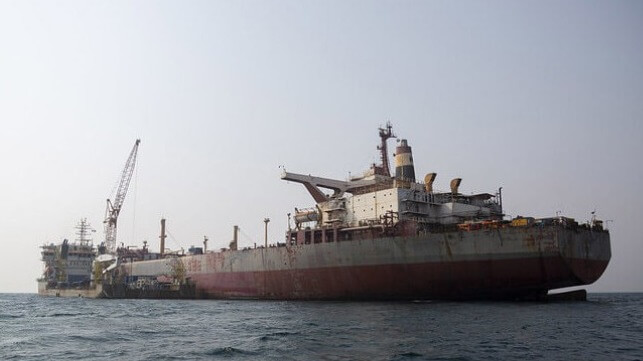UN Reports Oil Transfer from Decaying FSO Safer to Begin Next Week

During a briefing to the UN Security Council, it was reported that the oil transfer from the decaying FSO Safer off the coast of Yemen is scheduled to begin next week. The UN expects the transfer of more than 1.1 million barrels of oil to the replacement tanker should be completed by the end of July.
David Gressly, the UN humanitarian coordinator for Yemen and one of the leaders for the salvage effort, told the Security Council that the salvage team working on the FSO Safer since arriving at the site on May 30 has now stabilized the FSO. He said while the operation continues to have residual risk, the Safer is “fully stabilized for the ship-to-ship transfer of the oil.”
The salvage team from Boskalis’ SMIT Salvage reported that they were surveying the ship and conducting underwater inspections. They were also checking all the equipment necessary for the offloading of the oil and brought aboard a portable inert gas generator to stabilize the tanks which have not been properly vented in years.
“SMIT has certified to UNDP (United Nations Development Program) that the oil transfer can proceed,” Gressly told the Security Council during its update briefing on the situation in Yemen. He said SMIT has determined that the level of risk is “within an acceptable range.” Further, he reported that the rebel faction in Sanaa had just approved the transfer to proceed.
The rebels claim control of the oil. Under the plan, the UN purchased a VLCC from Euronav, the Nautica, and will transfer the oil to the replacement vessel. The FSO Safer will be removed for recycling. Gressly told the Security Council that the Nautica which has been waiting in Djibouti is preparing to depart for Yemen and will be positioned alongside the FSO Safer for the transfer.
The operation will continue after the FSO Safer has been drained and the tanks cleaned. The next step includes the delivery and installation of the catenary anchor leg for the Nautica.
Speaking as the president of the Security Council, UK Ambassador Barbara Woodward addressed the continuing financial shortfall in the project. She called on member nations to complete the project noting that the UN still needs to raise $25 million. She highlighted that the project was able to proceed because of a UN loan, noting that until it is repaid, “the UN is compromised in its ability to respond to current and future crises.”

that matters most
Get the latest maritime news delivered to your inbox daily.
Gressly told the Security Council, "The completion of the ship-to-ship transfer of the oil will be a moment when the whole world can heave a sigh of relief.”
The FSO Safer which was built in the 1970s, is currently positioned less than 40 miles from the coast of Yemen. Experts had predicted if the vessel failed the resulting oil leak would have far-reaching consequences across the Middle East. Pressure has been on the UN for more than three years to respond to the looming crisis. A 2020 deal for the UN to send inspectors to the vessel collapsed but in early 2022 the agreement was reached to transfer the oil from the FSO Safer.
